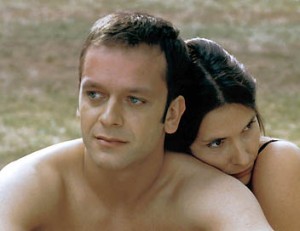Ambling clumsily, languorously, emotionlessly from graveyards all over the world, seventy million corpses have suddenly, inexplicably risen from the dead, filled their lungs with oxygen after an extended exhale and shuffled back into their mortal coils. Roughly 13,000 of these taciturn zombies slowly stream back into the small French city which was formerly their home, and the locals have to figure out how to accommodate the return of their dearly departed. “The unthinkable has happened,” says a bureaucrat, stating the obvious, to his colleagues. The newly immortal, disoriented and barely capable of speech, are warehoused in empty government buildings until they can be re-acclimated and reclaimed. But most people aren’t eager to reunite, even the aforementioned official whose wife is returned to his care. “I can’t stand her sweet smiles anymore,” he guiltily admits. “They scare me.”
In his 2004 avant zombie film, Robin Campillo turns out an arch allegory about how relationships can stagnate and love run cold, but he’s also examining the nature of neurology, how the brain adjusts to surprising situations and creates new realities as a means of survival. Scientists (and art critics) have noticed that the first time someone hears atonal music or sees a surrealist painting, the experience can cause emtional turmoil. But after the initial jolt, what’s unthinkable becomes acceptable. First you shock them, and then they put you in a museum. The same goes for shocking emotional episodes. In these cases, the brain is its own electrician, rewiring our ability to view the world.
 The movie, while suitably somnambulant, doesn’t fully exploit its fantastic set-up, but it does make some provacative points, most notably that the zombies aren’t the only ones who’ve been altered by death. The survivors have grieved and mourned and moved on. Even if they were stuck in the past, that past isn’t what came home to them. That’s gone forever.
The movie, while suitably somnambulant, doesn’t fully exploit its fantastic set-up, but it does make some provacative points, most notably that the zombies aren’t the only ones who’ve been altered by death. The survivors have grieved and mourned and moved on. Even if they were stuck in the past, that past isn’t what came home to them. That’s gone forever.
“His reality will never be yours,” says a doctor to a woman who is having trouble adjusting to her returned husband’s cold embrace. But you can’t really blame the zombies. They simply aren’t who they were. None of us are.•

